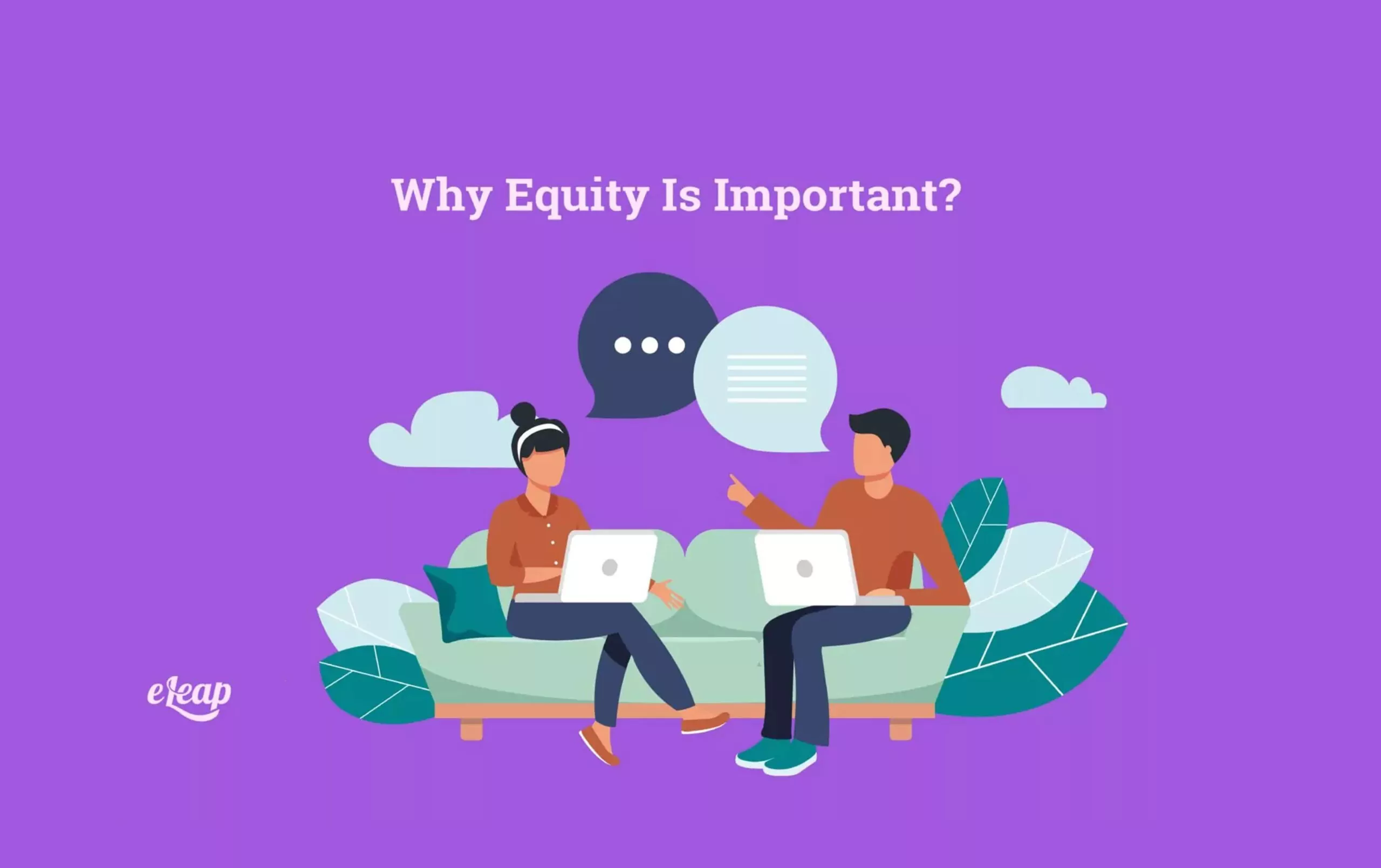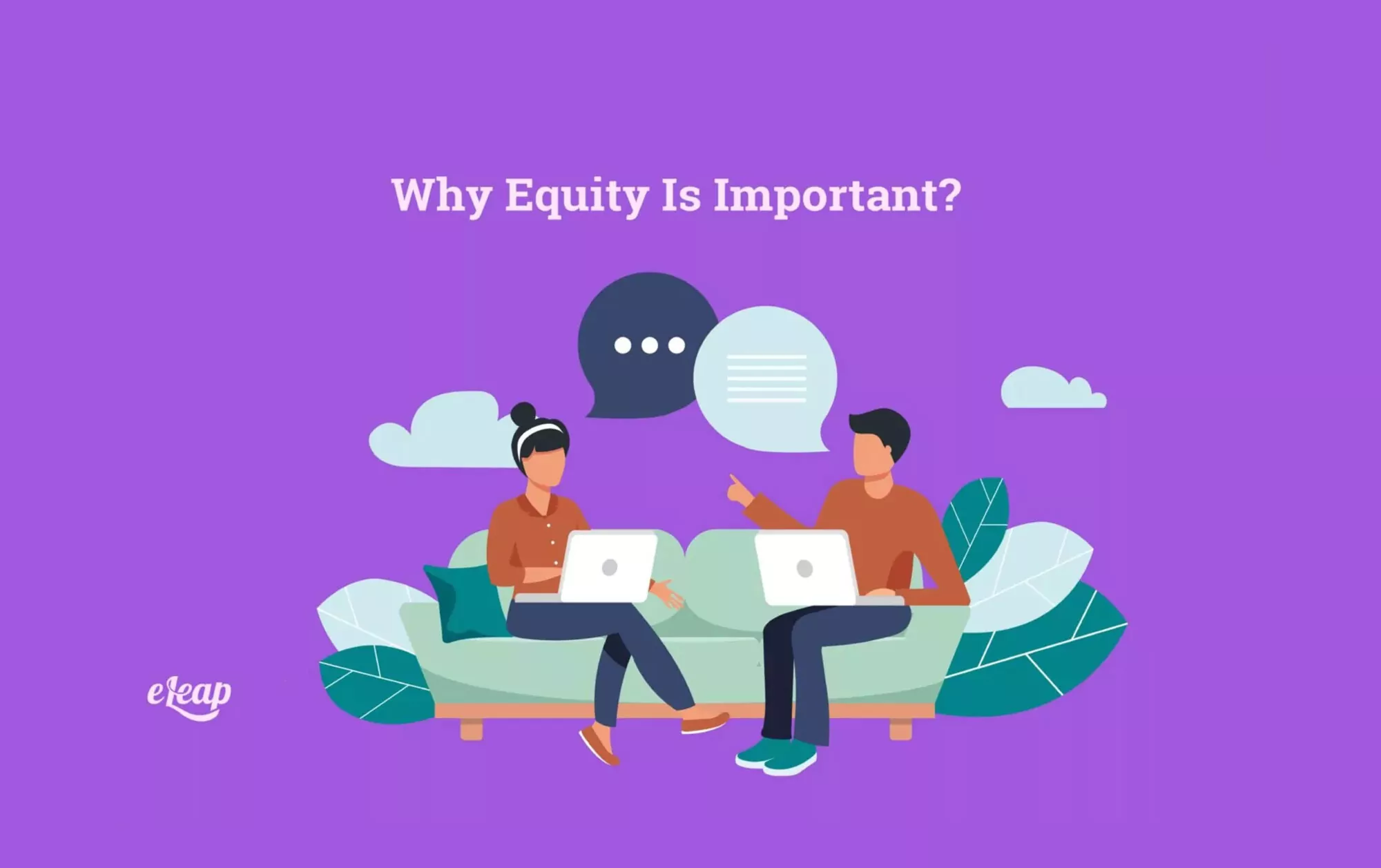Why Equity Is Important?

The business world as we know it is changing at a rapid pace, which may make managers ask why equity is important. They may also consider what the difference is between diversity, equity, and inclusion.
The fact of the matter is that in today’s modern business world, diversity, equity, and inclusion are frequently treated as buzzwords. When you make diversity, equity, and inclusion a priority, your entire organization, including the bottom line, will reap the benefits of this decision.
In your journey to implement a successful diversity, equity, and inclusion (DEI) program at your company, it’s important to understand what DEI truly is and the value it can bring to your company. Although there is no rule book that is universally applicable to all companies, there is a rule book that is specific to DEI. By taking the pieces and implementing them within your team, you discover why each piece is important.
Understanding Why Equity Is Important
Differences existing within a specific environment are what constitute diversity in that environment. This mainly refers to psychological, physical, and social variances that exist among persons in the workplace. These differences can affect anybody and everyone. A group, community, or organization is said to have diversity if it contains a wide range of social and cultural features in its members.
Equity ensures that all individuals have access to the same treatment, opportunity, and development in their careers. The goal of equity is to identify and remove any obstacles that prohibit certain groups from taking full involvement in activities.
The term “inclusion” refers to the way in which individuals with varying social identities experience themselves as a member of a broader community. You might be surprised to learn that diversity does not automatically lead to inclusion.
In reality, having a varied team of talented individuals does not guarantee that everyone on the team will experience a feeling of belonging or that they will be welcomed or valued in their work environment.
Within a company, the concepts of diversity, equity, and inclusion all work to support and strengthen one another. A sole concentration on diversity is insufficient to provide an equitable and inclusive working environment because an employee’s sense of belonging and experience of justice is of the utmost significance in this regard.
If an organization does not implement DEI methods, then they are missing out on possibilities to maximize the potential of its employees.
Researching Why Equity Is Important

A study evaluating the performance of businesses with varying degrees of workplace diversity looked at how well these businesses performed. According to what they discovered, businesses that have gender diversity and ethnic diversity are, respectively, 15% and 35% more likely to outperform counterparts that have less variety.
According to the findings of the same study, businesses that have greater racial and gender diversity also have better levels of sales revenue, more consumers, and higher profitability.
The implementation of DEI programs is a critical step in the process of creating engaged, content personnel. Employees that have increased levels of job satisfaction, higher levels of trust, and better levels of engagement are more likely to be found in organizations that have robust DEI efforts.
When diversity, equity, and inclusion programs are prioritized, there are benefits that may be observed at every level of the business, in addition to an increase in morale.
To put it more succinctly, strengthening effective DEI programs enables each employee to work each day, embracing their authentic self. Because of this, higher levels of engagement, productivity, and innovation are fostered, all of which contribute to a rise in income.
Building Equity in Your Team
The advantages of equity in our team are understood by most of us. When coupled with diversity and inclusion, equity brings expertise that fosters efficient cooperation and collaboration. If you’re stuck on how to implement this plan in your business, following the steps below will help you create a team that has the perfect blend of diversity, equity, and inclusion.
Don’t Confuse the Terms
The terms diversity, equity, and inclusion are frequently misconstrued and thought to mean the same thing. It’s important to understand the three terms all have a piece in creating a team that performs at optimum potential. You must also have an open mind and understand that included persons can have excluded beliefs.
For instance, diversity is the “who” of a community. It encompasses the individuals present and their distinctive viewpoints. The “what” that governs how those people interact in the space is both equity and inclusion. Since it takes effort to ensure their presence, diversity, equity, and inclusion cannot be taken for granted.
Recognize the Biases
Every individual has a special outlook on life that is shaped by their experiences and identities. Due to the fact that no two people will approach a problem in the same way, bias is created.
It should be noted that humans have a biological tendency to gravitate toward others who share their interests. Because of this, it is simple for one group of people to dominate the area through unconscious bias. If bias is not controlled, it can still persist in diverse workplaces and undermine inclusivity. As this is a normal gravitational pull, it can be hard to think outside the box and recognize when it happens. Having open, respectful dialogue about bias is essential in our lives.
Looking Outward Might Bring the Most Change
It takes fresh thinking to find innovative answers to persistent issues. You need a variety of perspectives to find the best answers to business problems. It might be necessary to leave your team and outsource information in order to bring new perspectives to the table. This is especially important when evaluating your current standing. It can be hard to understand what is needed from the inside.
Gaining perspective on the inner workings from all sides will make it easier to define your values and determine your future course of action. Additionally, your perspective will become more expansive, and you’ll be more open to the necessary change if you keep an open mind.
Adding Equity May Bring Discomfort Initially
It can be challenging to acknowledge your bias and let go of your expectations. Everyone is terrified of making a mistake. Therefore feelings of embarrassment frequently inhibit objectivity. It’s essential for us to make mistakes and possess the humility to accept responsibility when we do. Furthermore, slowing down your defensive instincts will allow you the chance for growth.
Trust is required for others to feel safe bringing issues to your attention, and accountability is crucial within a team. A portion of the uneasiness surrounding these subjects will be reduced by intentional time spent getting to know one another.
Genuine connections foster a sense of community that will ease challenging conversations. Exclusion prevents the vulnerability necessary to facilitate communication, which is another reason why equity is important.
Provide Space for Growth
It takes awareness of others’ emotions to make sure everyone in a group feels included. It’s essential to be actively involved. even when it’s with people you don’t normally work with or when tensions are high.
Mixing up the norm is important so we can gather more information about how team members work together. Managers can decide when to take the lead and when to follow by paying attention to both what is being said and who isn’t participating.
You can help create opportunities for people to share their ideas by paying attention to the language they use as well as their nonverbal cues.
This has become more difficult with hybrid and remote work. It’s hard to assess verbal cues and how everyone is feeling within the team when you only see them on screen. Digging deeper in your one-on-one meetings will help you get to the core of the matter and create a plan moving forward if you notice issues.
People will feel more at ease being vulnerable if there is a defined container and set of rules for the space. Team ties formed in advance flatten the dynamic of privilege and promote radical vulnerability.
Establish guidelines for the kind of feedback you want to give to each other and the manner in which you want to do it. Your communication style will alter the power balance in a way that encourages equity at work. Be mindful of what you bring to the table to ensure a balanced playing field.
Why Equity Is Important to You
Speaking of what you bring to the table, it takes your complete presence to be a member of your team. Being present gives us permission to honestly acknowledge our feelings. Self-awareness of this kind is conducive to embodied leadership. Recognizing our own strengths encourages us to put them to frequent use and build upon them.
You might find that practicing mindfulness is essential in determining what you will pay attention to in your environment. We can process information and make decisions in our communities thanks to this perceptiveness. Pay attention to your reactions to both things that bother you and things that motivate you. If you discover there are areas you can work on, and all of us have them, then you can create a plan moving forward with more self-awareness.
Diversity, equity, and inclusion are something that must be continuously pursued. While acknowledging the challenges in today’s culture, you can work towards making a difference.